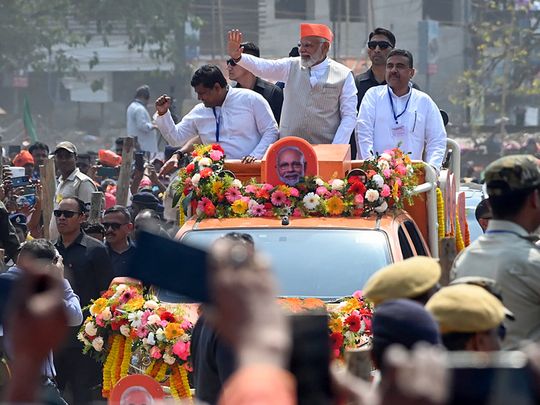
“There are two slogans coming from ruling Bharatiya Janata Party (BJP) in India’s 18th general elections. The one that you will see on the billboards is “Modi ki guarantee”, Modi’s guarantees, consolidating the gains of Prime Minister Narendra Modi’s high popularity ratings. The other one, which you will hear more often on social media and television, is “Abki baar 400 paar”. The BJP wants to win at least 370 of the 543 seats in the Lok Sabha, the lower house of the Indian Parliament. It wants its small regional allies to win at least another 30 seats.
Even the most optimistic surveys, and the most pro-BJP analysts won’t be able to explain how the BJP-led National Democratic Alliance is going to cross 400 seats. It seems a bit fanciful. So why make such a claim?
What we see here is the anchoring effect, used in marketing as a regular practice. When a company offers a discount, the discounted price sounds reasonable because they have anchored you in the pre-discount price. If you see a product that sells for $1000, and then one day you see it on discount for $800, you are willing to pay $800 for it because in your mind, you are anchored at $1000 as the asking price of the product.
Everywhere in India today, people are asking each other, how many seats can the BJP get? Since the BJP has anchored us at 370-400, even the sceptics are unable to say that the BJP could go down from its 2019 tally of 303 seats. They can only go up, it seems, the question is by how much.
From 1989 to 2000, spanning seven Lok Sabha elections, no party won a clear majority. India’s national elections came to be called “sum of the states”. India was too big for clear simple majorities, the pundits theorised. The Congress dominance was a product of the freedom movement and cannot be replicated by anyone ever again, they said.
In the 2014 general elections, the Narendra Modi campaign came up with the slogan “Mission 272+”, 272 being the simple majority mark. An insider told me how the slogan was meant to be only “Mission 272”. Senior leaders in the party had two objections to this slogan. One, they said, no party had won a clear majority on its own for 25 years now. To claim that we are going to do so would be ridiculous and laughable. Secondly, they worried about the NDA allies. If the BJP publicly says it was a clear majority of its own, the allies might well ask, what about us? Why are we in this alliance?
To pre-empt such a feeling among the regional allies, the slogan was changed to “Mission 272+”. The plus was for the allies.
The rest is history. The BJP won 282 seats, ending the coalition era and starting a new era of BJP dominance.
In the 2014 general elections, Praveen Chakravarty, head of the Congress party’s data unit, told The Hindu newspaper that the Congress was likely to triple its seats from the 2014 tally of 44. In other words, he set the public expectation — the anchor — at less than half the majority mark. The result was that the Congress party could increase its tally from 44 to 52, a mere 8 seats.
This election, the Congress party or the “INDIA” alliance that it leads, hasn’t even made a claim as to the number of seats they think they’re winning. At least not in a non-stop repetitive way that it would stick with voters.
Another BJP trick at play this election is to prepare a list of attack points to put the opponent on the back foot. Let the opponent keep defending themselves so that their energies to attack to BJP are diverted. Offence is the best form of defence.
So the BJP out of the blue came up with an attack on the Congress party over an island deal in 1974. It accused the Congress of giving away the Katchatheevu Island to Sri Lanka. The truth is that it was done as part of a larger set of agreements to the mutual benefit of Indian and Lankan fishermen.
Katchatheevu has nonetheless been an emotive issue in Tamil Nadu, a southern frontier the BJP is aiming to capture. The controversy also helps the BJP make the point that it is better suited for India’s national security than the Congress.
One of the BJP’s persistent charges against the Congress is that of nepotism, called “dynastic politics” in India. Few voters, if any, care about it, because lots of nepo-netas (to coin a new term) win elections. The BJP’s candidates announced so far include 20% nepo-netas, whereas the Congress is only slightly ahead with 25%.
From law to Bollywood, big business to the news media, nepotism is the norm in India. So why does the BJP single out the Congress and other opposition parties for it? Again, it is only to put them on the back foot, preventing them from setting, say, unemployment or inflation as the agenda. And there in lies the rub.












